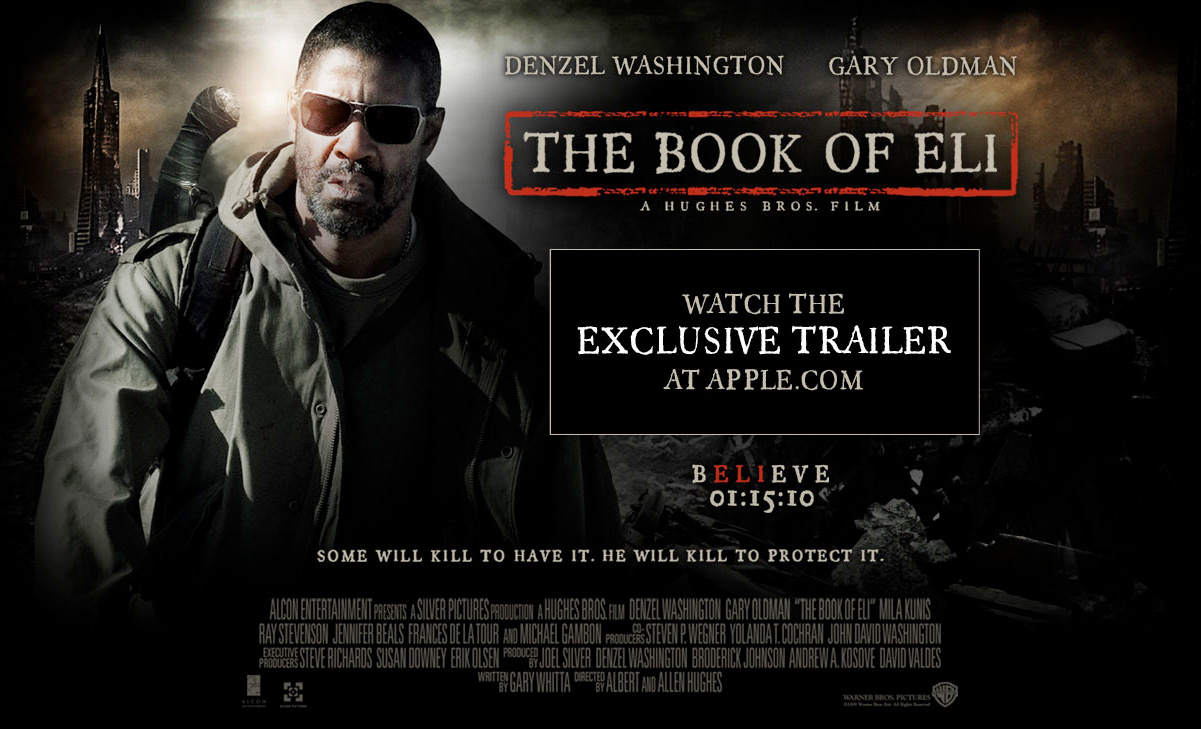
Belief in religion, it has been said, is not logical. It cannot be proven with mathematical equations by the scientific community, and therefore followers are sometimes looked at as having, as juxtaposition, an ability to suspend disbelief in order to believe.
In The Book of Eli, Denzel Washington isn’t interested in the opinions of those who would mock his faith. He likely wouldn’t lend an ear of credence to anyone claiming his quest as being futile or his goal as being unattainable. He knows that he’s on the right path simply because he knows it.
The Plot of Eli
In the Hughes Brothers film, Denzel Washington plays an individual apparently named “Eli” who, simply put, is on a quest to protect and deliver a certain book to a destination that God has outlined for him. The evil Carnegie, played with lascivious glee by the uncanny Gary Oldman, seeks to possess the book, believing that he can rule over the weak and oppressed even more easily with the words found inside.
The Acting of Eli
The film is superbly acted by pretty much everyone involved. Washington has stated that he knew immediately after one day on the set with Oldman that he chose the wrong part, because Oldman plays the role of Carnegie in such scene stealing fashion. Washington himself is in fine form, and his role as Eli is played with the art of a master painter; broad strokes, an easy realism, and the ability to be both bold and understated. It is a virtuoso performance by an actor at the top of his game. He is electric and holds attention whenever he is on the screen.
The supporting players are also effective, with Mila Kunis as Solara (named, for some reason, after the events that led to the apocalypse) and Jennifer Beals (Flashdance) as her mother, and a wonderful Tom Waits turn as a shopkeeper who may or may not be trusted.
Is the Book of Eli Any Good?
Some have criticized the film as having a Christian Fundamentalist agenda. Being that the Hughes Brothers are on record as being atheists, it becomes an amusing accusation. Instead, the film is a celebration of the human spirit; bold, driven, unblinking, never wavering from the undertaken quest.
Certainly (and ironically), the Hughes’ have crafted one of the more spiritually grounded cinematic post-apocalyptic visions. The film has been compared to the Mad Max films because of it’s washed out look, but the comparisons pretty much end there. What really sets it apart from other post-apocalyptic movies is it’s humanity. It’s a dark film, but it has a unique wit that carries throughout. The presence of Al Green’s beautiful voice also grounds the film emotionally, lending an air of spirit to what is, in an understatement, a pretty tough set of circumstances even for the resilient Eli.
The climax of the film has left many critics perplexed, some saying that it ‘jumps the shark’ and is simply too unrealistic. Some will find it to be so, undoubtedly. Others may like the notion of being swept away to a different world for a time, with the very appeal being that age old cinematic tale: these things don’t seem to manifest themselves in real life everyday, and thus seeing them onscreen is exhilarating. Doubtlessly, still others will leave the film feeling spiritually renewed, seeing it as more of a modern parable than just an action film. None of those reactions would be wrong depending on the person viewing, which makes Eli a pretty unique piece of work. If nothing else, most will leave the theater still thinking about the movie, and probably for days afterward; the highest compliment for a cinematic work.
Some advice: avoid discussing the end of the movie before seeing it.
The Book of Eli is probably more like the ultimate ‘B’ movie; uncompromising, lovingly crafted, outlandishly devised, and probably requiring a suspension of disbelief that some are just not capable of. Those who are may find viewing the film to be a very rewarding experience.


